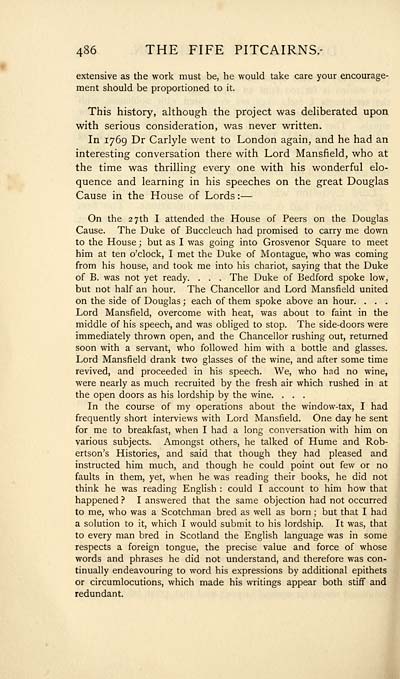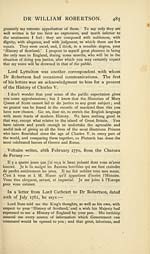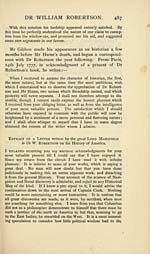History of the Fife Pitcairns
(588) Page 486
Download files
Complete book:
Individual page:
Thumbnail gallery: Grid view | List view

486 THE FIFE PITCAIRNS.-
extensive as the work must be, he would take care your encourage-
ment should be proportioned to it.
This history, although the project was deliberated upon
with serious consideration, was never written.
In 1769 Dr Carlyle went to London again, and he had an
interesting conversation there with Lord Mansfield, who at
the time was thrilling every one with his wonderful elo-
quence and learning in his speeches on the great Douglas
Cause in the House of Lords : —
On the 27th I attended the House of Peers on the Douglas
Cause. The Duke of Buccleuch had promised to carry me down
to the House ; but as I was going into Grosvenor Square to meet
him at ten o'clock, I met the Duke of Montague, who was coming
from his house, and took me into his chariot, saying that the Duke
of B. was not yet ready. . . . The Duke of Bedford spoke low,
but not half an hour. The Chancellor and Lord Mansfield united
on the side of Douglas ; each of them spoke above an hour. . . .
Lord Mansfield, overcome with heat, was about to faint in the
middle of his speech, and was obliged to stop. The side-doors were
immediately thrown open, and the Chancellor rushing out, returned
soon with a servant, who followed him with a bottle and glasses.
Lord Mansfield drank two glasses of the wine, and after some time
revived, and proceeded in his speech. We, who had no wine,
were nearly as much recruited by the fresh air which rushed in at
the open doors as his lordship by the wine. . . .
In the course of my operations about the window-tax, I had
frequently short interviews with Lord Mansfield. One day he sent
for me to breakfast, when I had a long conversation with him on
various subjects. Amongst others, he talked of Hume and Rob-
ertson's Histories, and said that though they had pleased and
instructed him much, and though he could point out few or no
faults in them, yet, when he was reading their books, he did not
think he was reading English : could I account to him how that
happened ? I answered that the same objection had not occurred
to me, who was a Scotchman bred as well as born ; but that I had
a solution to it, which I would submit to his lordship. It was, that
to every man bred in Scotland the English language was in some
respects a foreign tongue, the precise value and force of whose
words and phrases he did not understand, and therefore was con-
tinually endeavouring to word his expressions by additional epithets
or circumlocutions, which made his writings appear both stiff and
redundant.
extensive as the work must be, he would take care your encourage-
ment should be proportioned to it.
This history, although the project was deliberated upon
with serious consideration, was never written.
In 1769 Dr Carlyle went to London again, and he had an
interesting conversation there with Lord Mansfield, who at
the time was thrilling every one with his wonderful elo-
quence and learning in his speeches on the great Douglas
Cause in the House of Lords : —
On the 27th I attended the House of Peers on the Douglas
Cause. The Duke of Buccleuch had promised to carry me down
to the House ; but as I was going into Grosvenor Square to meet
him at ten o'clock, I met the Duke of Montague, who was coming
from his house, and took me into his chariot, saying that the Duke
of B. was not yet ready. . . . The Duke of Bedford spoke low,
but not half an hour. The Chancellor and Lord Mansfield united
on the side of Douglas ; each of them spoke above an hour. . . .
Lord Mansfield, overcome with heat, was about to faint in the
middle of his speech, and was obliged to stop. The side-doors were
immediately thrown open, and the Chancellor rushing out, returned
soon with a servant, who followed him with a bottle and glasses.
Lord Mansfield drank two glasses of the wine, and after some time
revived, and proceeded in his speech. We, who had no wine,
were nearly as much recruited by the fresh air which rushed in at
the open doors as his lordship by the wine. . . .
In the course of my operations about the window-tax, I had
frequently short interviews with Lord Mansfield. One day he sent
for me to breakfast, when I had a long conversation with him on
various subjects. Amongst others, he talked of Hume and Rob-
ertson's Histories, and said that though they had pleased and
instructed him much, and though he could point out few or no
faults in them, yet, when he was reading their books, he did not
think he was reading English : could I account to him how that
happened ? I answered that the same objection had not occurred
to me, who was a Scotchman bred as well as born ; but that I had
a solution to it, which I would submit to his lordship. It was, that
to every man bred in Scotland the English language was in some
respects a foreign tongue, the precise value and force of whose
words and phrases he did not understand, and therefore was con-
tinually endeavouring to word his expressions by additional epithets
or circumlocutions, which made his writings appear both stiff and
redundant.
Set display mode to:
![]() Universal Viewer |
Universal Viewer | ![]() Mirador |
Large image | Transcription
Mirador |
Large image | Transcription
Images and transcriptions on this page, including medium image downloads, may be used under the Creative Commons Attribution 4.0 International Licence unless otherwise stated. ![]()
| Histories of Scottish families > History of the Fife Pitcairns > (588) Page 486 |
|---|
| Permanent URL | https://digital.nls.uk/95722707 |
|---|
| Description | A selection of almost 400 printed items relating to the history of Scottish families, mostly dating from the 19th and early 20th centuries. Includes memoirs, genealogies and clan histories, with a few produced by emigrant families. The earliest family history goes back to AD 916. |
|---|

